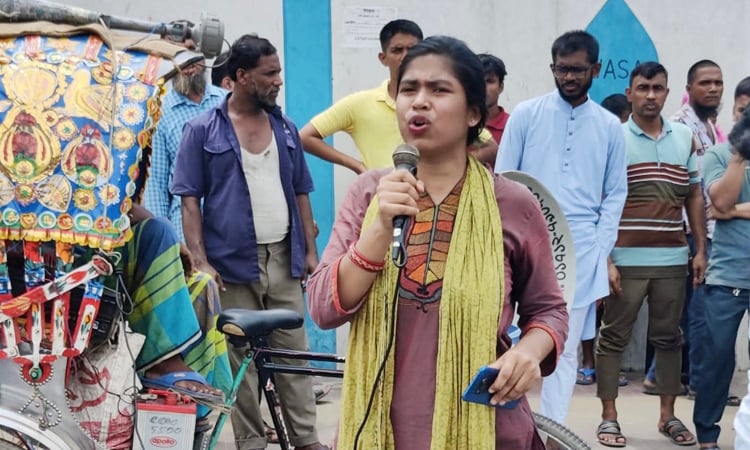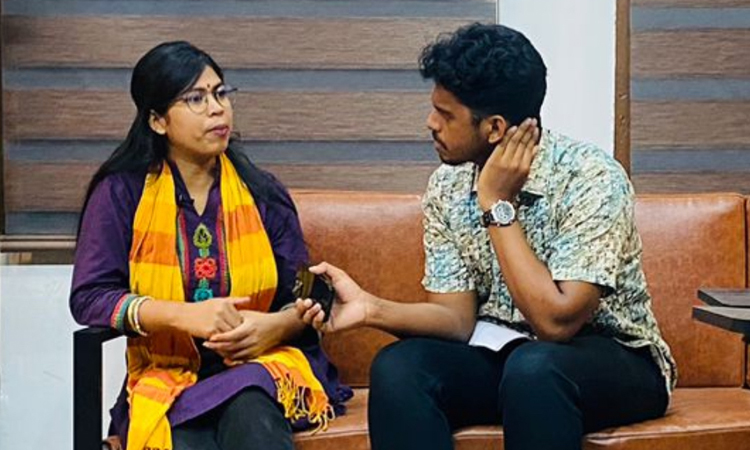
By Mohiuddin Mujahid Mahi
DHAKA, June 30, 2025 (BSS) – Nazifa Jannat, a student of the English Department at East West University and Vice President of the Bangladesh Student Union, emerged as one of the central coordinators of the anti-discrimination student movement during the July Students-People’s Uprising.
She played a pivotal role in organizing protests in Rampura and her university campus East West University, and thus became a key figure in mobilizing students across private institutions.
Coming from a politically active family, Nazifa’s interest and commitment to politics have been shaped since childhood. The stories of the Liberation War and her family’s political history profoundly influenced her thinking. This political consciousness inspired her to join leftist student organizations, where she helped spark a new awareness among students of private universities.
Nazifa’s struggle has been tough—she has spent time in prison for her political activities and suffered violence and oppression. She has faced countless challenges standing against state-backed exploitation and anti-transformational forces. Yet, her resilient return and steadfast leadership have grown the movement in strength and scale.
In this interview with Bangladesh Sangbad Sangstha (BSS), Nazifa Jannat shares her political journey, experiences of persecution, and the story of organizing and leading the movement. Here is the interview

BSS: How did your political journey begin? What made you enter politics?
Nazifa Jannat: Both my parents are teachers, so there were many books at home since I was young.I grew up in a small town but received political insight from my father. The bloodied images of the August 21 grenade attack and the killing of Bishwajit deeply shook me.
While still in school, I started reading -- Samresh Majumdar’s book ‘Garbadharini’, and books on the Liberation War, my father’s political thoughts -- all of these together built the foundation of my awareness. My maternal grandfather and uncle were freedom fighters, and my father and uncle also helped during the liberation war. So, I developed an interest in the country’s politics and formation process.
In college, I got involved in voluntary works, and then at university, I came into contact with some people who encouraged me to be politically active. That’s when I learned about the 2018 quota reform movement. I got enrolled in university in 2017. I felt that doing something alone wouldn’t work—I needed a platform that matched my beliefs. I said I wouldn’t engage in terrorism or violent politics. A senior then told me I could join a leftist organization. Since I had already read leftist texts, I joined Chhatra Union. That’s how I came into politics.
Do you recall the suppression of dissent during the nearly 16 years of the Awami League’s rule? You were always active in the field—have you ever been persecuted?
Nazifa Jannat: Speaking against that autocratic system of oppression, I was imprisoned even within a short political career. I went to jail in 2021. You know, Mushtaq Ahmed was arrested for writing about government corruption many times, but despite many bail applications, he was denied bail. In jail, he was severely tortured and murdered with state support. The day after, leftist parties organized a torch procession to protest his murder. From there, seven of us were arrested, and the police beat us severely. We spent over ten days in jail.
During that terrifying time of the coronavirus, we collectively suffered state oppression. I personally faced much repression. Whenever I said anything anywhere, Awami League supporters spread it online. They cyberbullied us, issued death threats—everything.
What was your experience like in jail, and how did going to jail impact your life?
Nazifa Jannat: It left a huge impact on my life because I was in an environment that I never want to experience again. The greatest pain was realizing the state apparatus is actually an instrument of exploitation. Even though we committed no wrongdoing, we were sent to jail. The police threw torches at us, brutally beat us, and eventually filed attempted murder charges against us. They called us state enemies. This process of pitting the state against us gave me a new perspective: Is this really the state that treats me with such oppression?
Meanwhile, the wealthy commit many crimes and still survive in society. But when we protest rationally without wrongdoing, we get arrested. It showed me how the state can crush us if it wants. I went through such a situation. Then I felt that the responsibility to guard this country is ours. The very place where they brand us as state enemies is where the feeling to protect this country grows within us. I think that feeling and transformation has been my evolution from that place until now.
I was in jail for 10 days. On February 28, 2021, after the torch procession, we were arrested and taken to Shahbagh police station, then to Dhanmondi police station at night. The next day, we were produced in court, and 10 days remand was requested. Eventually, we were sent to jail. A big thanks to the tireless efforts of our comrades outside that we were released; otherwise, we might have been held for over one and a half months, as the Eid holidays and court closures were about to start.
Jail life was horrible. Inside, I saw Papiya, who had been arrested for the Awami League’s financial scandal at the time. I met many others as well. It was a very diverse experience. Because in jail, I saw all kinds of people—from drug dealers to murder suspects. There was no classification system there. Someone accused of murder could be lying right next to me.
How did you first get involved with the movement?
Nazifa Jannat: Actually, at first, my involvement was like this: The movement really began in July—I later learned preparations had been going on even in June. But from the first of July, some demonstrations started.
The Democratic Student Alliance held a press briefing on July 07 at Madhur Canteen. After the press briefing, a class boycott and ‘Bangla Blockade’ program was announced. We went from there to Nilkhet intersection and Science Lab area. Seeing the students’ temperament that day, I felt something huge was about to happen. I participated continuously on the 7th, 8th, and 9th July. I also led rallies to Shahbagh.
How did you organize the movement in private universities—especially among students of Rampura and East West University?
Nazifa Jannat: At the initial stage, I had some hesitation. I was joining marches and demonstrations every day at Dhaka University, but nothing was happening at my own place—private universities. Then I realized participation alone wasn’t enough; I had to take initiative.
I contacted Rakib Bhai from Dhaka College and Hannan Masud. I asked for contacts to bring private university students together. They gave me some references. Then I started contacting— a friend from East West University, a younger brother from BRAC, Asad Bin Roni from Chhatra Odhikar Parishad—and formed a core group.
The first meeting was small—only 8 to 10 people. At East West, only 10 to 12 students would come out daily, but there was no organized movement. We decided this wouldn’t work. We planned a big demo on July 10. That day, we first blocked one side of the road in front of East West University at Rampura Bridge. Students from Imperial College also joined. Then we blocked the streets from both sides.
At first, police came and tried to stop us. Our only thought was, “This road is ours; our voices will be heard here.” The next day, on the 11th, police came early to our campus and told us not to take to the streets, saying it was not allowed today. We were 11 students; the number of police were about 30. Still, we said, “We must hold a human chain.” We did so beside the police. Slowly, more students gathered. Media came and took footage.
After that, number of students increased daily. Besides East West, students from State University, Imperial, and others started joining us at Rampura Bridge in solidarity. Some skipped classes, others left home to join, some spoke to the media. Rampura and East West students became a center of consciousness where the stigma that “private university students don’t understand politics” was proven false.
How did the movement spread? What happened on the 14th, 15th, and 16th?
Nazifa Jannat: On July 14, there was an attack in Comilla. That night, Sheikh Hasina held a press briefing where she mockingly called protesters ‘Rajakars’ and told teachers, “Inform me when you get tired.” This insult angered us. Our presence at programs grew. Police said they wouldn’t let us take to the streets. We said we wouldn’t leave until the program ended. The media covered this, and it spread widely.
On the 15th, there was an attack on Dhaka University. On the 16th, more than 2,000 people gathered at Rampura Bridge. Even school and college students came. That day, the news of Wasim dying in Chittagong and Abu Sayeed in Rangpur transformed the whole movement.
How was the 18th? What was your experience leading on that day?
Nazifa Jannat: July 18 was the most terrifying day of my life. I used to come by rickshaw from
Shantinagar to Rampura Bridge with a mike. That day, no one wanted to take the microphone. By 10 a.m., 300 students had gathered. Suddenly, tear shells started.
I got on a bike and went to the scene. At Rampura Bridge, I saw gunfire about 100 feet away. I went around behind BRAC and tried to manage the students. Police were shooting; students were running. Without a microphone, I kept telling them, “Stop here, don’t do that.” Students were getting shot. Someone fell in front of me, after being shot. I felt like I was seeing two faces together in the movement— an organized force attacking unorganized and unarmed people without any hesitance.
Were there police threats or family pressure during the movement? What about arrests and raids?
Nazifa Jannat: Yes, there was police pressure. Police would enter our home and arrest many. Police and Awami League supporters pressured my father to send me back home from Dhaka. Awami League affiliates threatened my father saying “send your daughter home.” Each time my father called me, I used to say, “I am home.”
Students were taken to Gulshan and Rampura police stations. We contacted lawyers to arrange free legal aid. Many students were detained at police stations. I went with Liton Nandi and some Dhaka University students to try to free them. I couldn’t stay home at night and kept my phone switched off because it was tracked. I had contact with the police; they knew I wanted to keep students calm. Despite police pressure, I coordinated so the situation stayed under control.
What kind of work did you do to build unity and organization among students during the
movement?
Nazifa Jannat: Being a private university student myself, I took responsibility for building the movement there. I called friends I knew and formed small groups to organize demonstrations. There was a lot of reluctance among private university students, which I tried to overcome. I coordinated with student parties and the Democratic Student Alliance. In this way, I united students and expanded the movement.
There were talks about an ‘armed plan’ during the movement—do you know anything about this? Was it real?
Nazifa Jannat: I have heard about it—Nahid Islam or Asif Mahmud shared videos. But for me, though not irrelevant at the time, it was not feasible. Our side was already facing guns, arrests, and beatings. Options were very limited then. Some said, “We must become armed,” but I think we were blessed not to have to go that way.